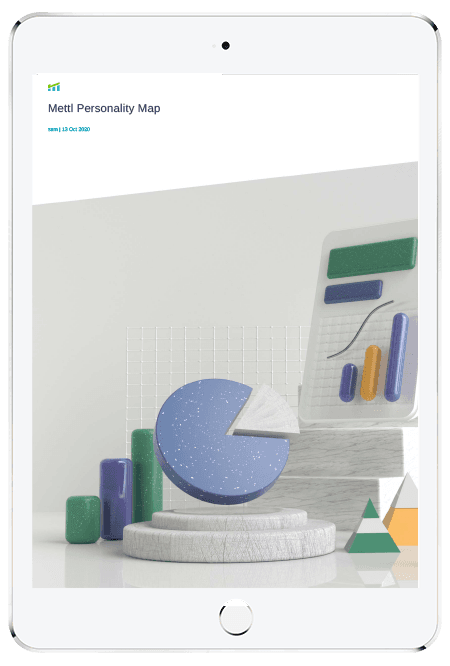Digital Readiness Assessment to Gauge the Digital Readiness of Your Workforce
The digital readiness assessment is a structured digital readiness test to measure employees’ key digital abilities, intrapersonal as well as interpersonal skills and potential for change management and innovation. The test is based on a digital readiness model developed by subject matter experts.
Ready to Use
Psychometric, Aptitude
0-2 years
Moderate
55 Minutes
109 Questions
Mid-management level roles, First-time manager roles
Indonesian, English India, English Global, English UAE
Inside This Assessment
Mercer | Mettl’s digital readiness assessment helps you understand if your employees possess suitable behavioral competencies and cognitive skills to adapt to and manage digital transformation processes. The purpose of this digital transformation readiness assessment is to test the abilities that vouch for an employee’s preparedness and level of readiness for thriving in a changing digital culture of the organization.
SKILL LIBRARY
Digital Readiness Competency Framework
Get a detailed look inside the test
Competency Under Scanner
Interpersonal
Intrapersonal
Business
Mental Agility
Competencies:
It refers to building professional networks and personal relationships within and outside the company to gather information and resources, ensuring individual and organizational success.
This refers to the ability to convince others and compromise to achieve results effectively.
t refers to working with each other and ensuring people are treated with respect and sensitivity regardless of individual differences to accomplish shared objectives.
Competencies:
Tendency to learn new skills by being open to new ideas and keeping oneself up-to-date with relevant knowledge
Orientation to face challenges or adversity positively and manage one's emotions in a positive and effective manner.
Competencies:
Orientation to approach issues differently, offer out of box solutions and challenge status-quo.
Being comfortable in novel or unknown situations, understanding the rationale for change and finding synergies to effectively transition during the change process.
Ability to think abstractly, examine problems in unique and unusual ways and can make fresh connections between different concepts.
Customize This Test
Flexible customization options to suit your needs
Choose easy, medium or hard questions from our skill libraries to assess candidates of different experience levels.
Add multiple skills in a single test to create an effective assessment. Assess multiple skills together.
Add, edit or bulk upload your own coding questions, MCQ, whiteboarding questions & more.
Get a tailored assessment created with the help of our subject matter experts to ensure effective screening.
The Mercer | Mettl Advantage
Frequently Asked Questions (FAQs)
1. What if a person takes an assessment in a socially desirable manner or fakes or manipulates the responses?
The assessment has been designed on the ‘semantic differential’ format, which requires candidates to consider their preferences and choose between two " equally desirable" statements. The assessment also delivers ‘instructional warnings,’ where candidates are informed that distorted or fake responses will invalidate the assessment. The assessment tool can also identify specific response patterns that may indicate fake responses.
2. Can we determine the appropriate levels of behaviors required for a specific job role in an organization?
We have taken all necessary steps to reduce the possibility of test takers trying to present themselves in a socially desirable manner. For example, the test follows a ‘semantic differential’ format, which makes it hard to ‘guess’ the appropriate response. Additionally, the items are presented in a format that requires one to consciously think about one's preferences and then choose a more ‘desirable’ statement. The tool also identifies specific patterns of the responses and can indicate if candidates attempt to respond dishonestly.
3. Will your assessment score candidates who are applying for jobs appropriately?
Yes. Mercer | Mettl has undertaken efforts to include a diverse and representative sample during assessment development. Further, Mercer | Mettl also offers options to optimize assessment content and scoring based on the context provided by our clients. Ask us about our local norms and validation, and we’ll gladly assist you with them.
4. Can a company's competency framework be mapped to the assessments?
Yes. We can provide customized assessment solutions that consider the organization’s requirements and competency framework to determine the appropriate behaviors that indicate success in the organization's context. Please write to Mercer | Mettl with the request for assistance.
5. How do we determine the norm group's proficiency level thresholds?
The normal probability distribution of scores of a particular norm group determines the proficiency levels required.
6. How are norms decided for MPP?
We have taken all necessary steps to reduce the possibility of test takers trying to present themselves in a socially desirable manner. For example, the test follows a ‘semantic differential’ format, which makes it hard to ‘guess’ the appropriate response. Additionally, the items are presented in a format that requires one to consciously think about one's preferences and then choose a more ‘desirable’ statement. The tool also identifies specific patterns of the responses and can indicate if candidates attempt to respond dishonestly.
7. What if the reports generated for the psychometric assessments differ from the actual behavior, attitude or aptitude of the person?
We have taken all necessary steps to reduce the possibility of test takers trying to present themselves in a socially desirable manner. For example, the test follows a ‘semantic differential’ format, which makes it hard to ‘guess’ the appropriate response. Additionally, the items are presented in a format that requires one to consciously think about one's preferences and then choose a more ‘desirable’ statement. The tool also identifies specific patterns of the responses and can indicate if candidates attempt to respond dishonestly.
